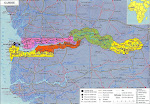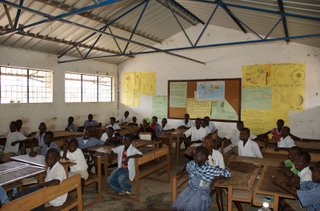Country Name: conventional long form: Republic of The Gambia
conventional short form: The Gambia
Independence: (From UK) 18 February, 1965
Ethnic groups: African 99% (Mandinka, 42%, Fula, 18%, Wolof, 16%, Jola, 10%, Serahuli, 9%, 0ther 4%) Non-African, 1%
Religions: Muslim, 90%, Christian, 8%, indigenous beliefs, 2%
Languages: English (official), Mandinka, Wolof, Fula and other indigenous vernaculars.
Literacy: (age 15 and over who can read and write)
total population: 40.1% male, 47.8%, female, 32.8%
Economy: "The Gambia has no confirmed mineral or natural resource deposits and has a limited agricultural base. About 75% of the population depends on crops and livestock for its livelihood. Small-scale manufacturing activity features the processing of peanuts, fish, and hides."
"The Gambia's natural beauty and proximity to Europe has made it one of the larger markets for tourism in West Africa."
"Unemployment and underemployment rates remain extremely high: short-run economic progress depends on sustained bilateral and multilateral aid, on responsible government economic management, on continued technical assistance from the IMF and bilateral donors, and on expected growth in the construction sector."






